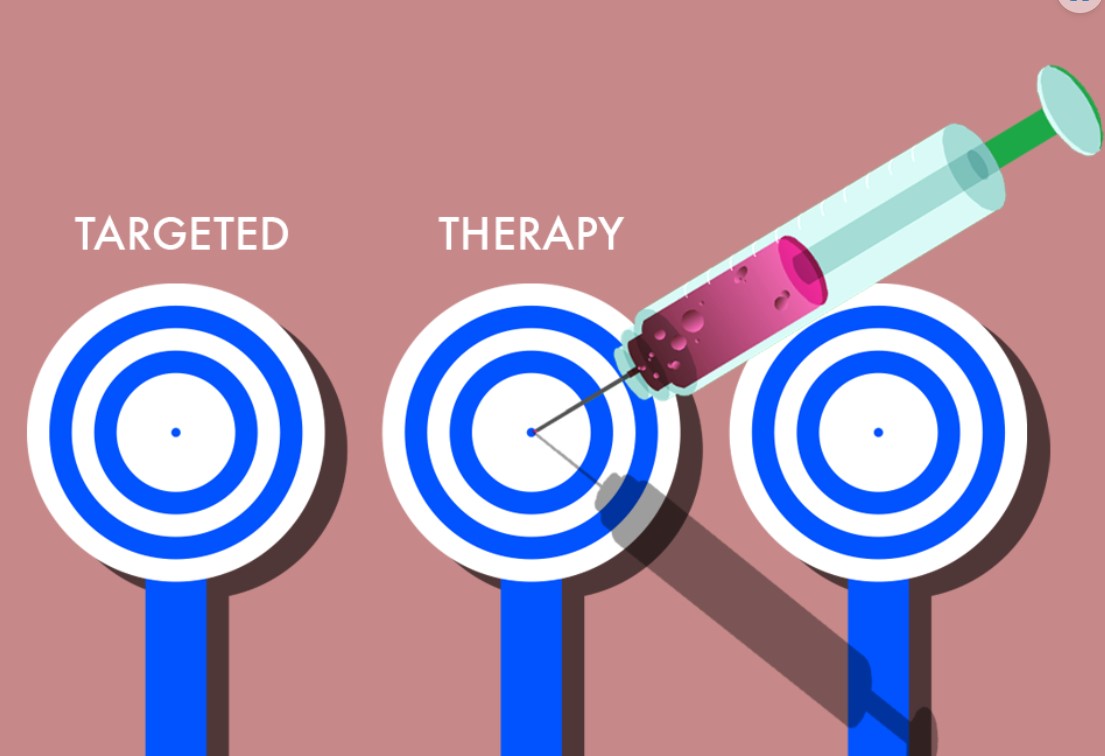ChatGPT said:
Targeted therapy is a type of cancer treatment that uses drugs or other substances to precisely identify and attack specific molecules (targets) involved in cancer cell growth, survival, or spread—while minimizing damage to normal cells.
🧬 How It Works:
Unlike chemotherapy, which affects all rapidly dividing cells, targeted therapy acts on specific genetic or molecular features of cancer cells—such as mutated genes, abnormal proteins, or cell signaling pathways.
🎯 Common Types of Targets and Drugs:
- Tyrosine Kinase Inhibitors (TKIs)
- Block enzymes that promote cell growth and division
- Examples:
- Imatinib (Gleevec) – for CML, GIST
- Erlotinib (Tarceva) – for EGFR+ lung cancer
- Sunitinib – for kidney cancer, GIST
- Monoclonal Antibodies (mAbs)
- Bind to cancer cell surface receptors or immune checkpoints
- Examples:
- Trastuzumab (Herceptin) – for HER2+ breast cancer
- Cetuximab – for EGFR+ colorectal/head and neck cancer
- Bevacizumab – inhibits VEGF (angiogenesis)
- Angiogenesis Inhibitors
- Block formation of new blood vessels needed for tumors to grow
- Example: Bevacizumab
- Hormone Therapies (also considered targeted)
- For hormone receptor-positive cancers
- Examples:
- Tamoxifen – blocks estrogen in breast cancer
- Abiraterone – blocks testosterone in prostate cancer
- PARP Inhibitors
- Target DNA repair defects
- Example: Olaparib – used in BRCA-mutated ovarian and breast cancers
- CDK4/6 Inhibitors
- Block proteins involved in cell cycle progression
- Examples: Palbociclib, Ribociclib – for HR+/HER2- breast cancer
🧪 How Targeted Therapy Is Selected:
- Genetic/molecular testing (biomarkers or tumor profiling) is essential.
- Tests identify mutations like:
- EGFR, ALK, ROS1 (lung cancer)
- BRAF (melanoma, colon cancer)
- HER2 (breast, stomach cancer)
- BRCA1/2 (breast, ovarian)
✅ Advantages:
- More precise and personalized
- Often fewer and less severe side effects than chemotherapy
- Can be used long-term to keep cancer under control
⚠️ Side Effects (varies by drug):
- Rash, diarrhea, liver problems
- Fatigue, hypertension, blood clotting issues
- Resistance may develop over time (tumor stops responding)
💡 Emerging Directions:
- Combination therapy with immunotherapy or chemotherapy
- Next-generation sequencing (NGS) to find more actionable targets
- Use in minimal residual disease or adjuvant settings

